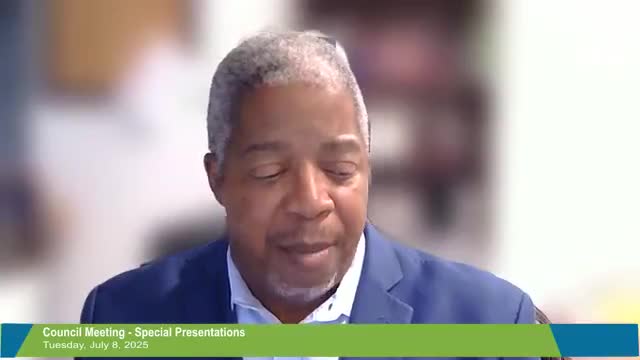Senate Passes Reconciliation Bill Impacting $3.25 Trillion Over 10 Years
August 01, 2025 | North Miami, Miami-Dade County, Florida
This article was created by AI summarizing key points discussed. AI makes mistakes, so for full details and context, please refer to the video of the full meeting. Please report any errors so we can fix them. Report an error »

In a recent council meeting held by the City of North Miami, significant discussions centered around the implications of a newly passed reconciliation bill that is poised to impact local governance and community services. The bill, which aligns closely with the president's platform, was passed through a complex legislative process involving both the House and Senate, ultimately receiving approval with narrow margins.
The reconciliation bill is not an appropriation bill but rather an authorizing bill, which allows Congress to allocate funds in specific ways. It is projected to affect the national debt by approximately $3.25 trillion over the next decade. This financial framework is crucial for local governments, including North Miami, as it opens avenues for funding various community projects.
One of the key highlights from the meeting was the introduction of a new housing credit aimed at supporting low-income housing. This initiative is designed to stabilize housing stocks and ensure that affordable housing remains accessible to residents. Additionally, the bill includes provisions for opportunity zones, which are expected to incentivize the development of workforce housing, a pressing need in many urban areas.
The council also discussed the establishment of a conservation fund, potentially amounting to $13 million, which could provide further resources for environmental initiatives if fully funded by Congress. This aligns with broader efforts to enhance community sustainability and resilience.
Moreover, the meeting addressed modifications to Medicaid and Medicare programs, particularly concerning Medicaid. These changes could lead to a significant number of individuals losing their health insurance, raising concerns about healthcare accessibility in the community. The Supplemental Nutrition Assistance Program (SNAP) also underwent adjustments, which may affect funding and operational costs, particularly for states with high error rates in program administration.
Lastly, the council touched on the Federal Communications Commission's (FCC) plans to auction broadband spectrum, which could have implications for local internet access and infrastructure development.
Overall, the discussions at the council meeting underscored the interconnectedness of federal legislation and local governance, highlighting how national policies can directly influence community welfare and development. As these initiatives unfold, North Miami residents and officials will need to stay informed and engaged to maximize the benefits of these legislative changes.
The reconciliation bill is not an appropriation bill but rather an authorizing bill, which allows Congress to allocate funds in specific ways. It is projected to affect the national debt by approximately $3.25 trillion over the next decade. This financial framework is crucial for local governments, including North Miami, as it opens avenues for funding various community projects.
One of the key highlights from the meeting was the introduction of a new housing credit aimed at supporting low-income housing. This initiative is designed to stabilize housing stocks and ensure that affordable housing remains accessible to residents. Additionally, the bill includes provisions for opportunity zones, which are expected to incentivize the development of workforce housing, a pressing need in many urban areas.
The council also discussed the establishment of a conservation fund, potentially amounting to $13 million, which could provide further resources for environmental initiatives if fully funded by Congress. This aligns with broader efforts to enhance community sustainability and resilience.
Moreover, the meeting addressed modifications to Medicaid and Medicare programs, particularly concerning Medicaid. These changes could lead to a significant number of individuals losing their health insurance, raising concerns about healthcare accessibility in the community. The Supplemental Nutrition Assistance Program (SNAP) also underwent adjustments, which may affect funding and operational costs, particularly for states with high error rates in program administration.
Lastly, the council touched on the Federal Communications Commission's (FCC) plans to auction broadband spectrum, which could have implications for local internet access and infrastructure development.
Overall, the discussions at the council meeting underscored the interconnectedness of federal legislation and local governance, highlighting how national policies can directly influence community welfare and development. As these initiatives unfold, North Miami residents and officials will need to stay informed and engaged to maximize the benefits of these legislative changes.
View full meeting
This article is based on a recent meeting—watch the full video and explore the complete transcript for deeper insights into the discussion.
View full meeting